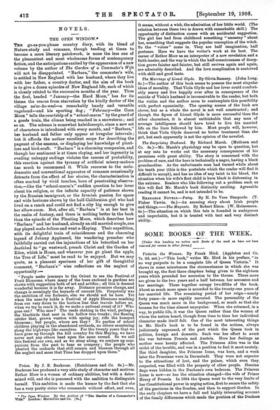Voices. By J. E. Buckrose. (Hutchinson and Co. 6s.)—Mr. Buckrose
has produced a very able study of character and motives. Esther Moor is a woman of ordinary abilities, but with a deter- mined will, and she is possessed with the ambition to distinguish herself. This ambition is made the keener by the fact that she has a very pretty sister who commands without effort, and even, " The Open Window. By the Author of "The Garden of a Commuter's Wife, London : Macmillan and Co. [6s.] it seems, without a wish, the admiration of her little world. (The relation between these two is drawn with remarkable skill.) The opportunity of distinction comes with an accidental suggestion. The girl has had from childhood something " uncanny " about her, something that suggests the popular conception of the witch. So the " voices" come in. They are half imagination, half pretence. Here we have the writer's work at its best. The career of Esther Moor as an interpreter of a new revelation and a faith-healer, and the way in which the half-consciousness of decep- tion grows fainter and fainter, but still revives again and again, are admirably described. And the love complication is contrived with skill and good taste.










































 Previous page
Previous page